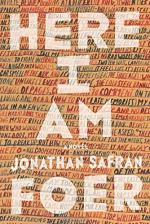|
This section contains 593 words (approx. 2 pages at 400 words per page) |

|
Here I Am Summary & Study Guide Description
Here I Am Summary & Study Guide includes comprehensive information and analysis to help you understand the book. This study guide contains the following sections:
This detailed literature summary also contains Quotes and a Free Quiz on Here I Am by Jonathan Safran Foer.
The following version of this book was used to create this study guide: Here I Am, by Jonathan Safran Foer. Farrar, Straus, and Giroux, New York, NY. 2016.
The title, and much of the book’s narrative and thematic content, refer to a story in both the Old Testament of the Bible and in the Hebrew Torah – specifically, the story of how God demanded that Jewish patriarch Abraham sacrifice his son Isaac in order to prove his (Abraham’s) faith. Each of the central figures in that story – God, Abraham, Isaac – use the phrase “Here I am” to reveal their presence to the others.
As the story begins, Jewish television writer Jacob and his architect wife Julia have busy lives, raising their three sons (Sam, Max, and Benjy, all individual, intelligent and precocious); interacting with Jacob’s father Irv (a renowned activist and writer); and worrying about the care of Jacob’s grandfather Isaac (an elderly survivor of the Holocaust). As the story develops, the family’s full but managed routine is shaken up by a series of unexpected events.
The first of these events is the discovery that eldest son Sam has been caught writing down racist and discriminatory words (including what is referred to as the “n-word”) and refuses to admit responsibility. This leads to complicated, fraught discussions about whether his bar mitzvah should be allowed to proceed. The second major event is Julia’s discovery that Jacob has a second cell phone, and her simultaneous discovery that he has been sending crudely suggestive text messages to another woman. The third and fourth major events in the family’s life occur at roughly the same time – Isaac commits suicide, and an earthquake devastates the Middle East, including the Jewish state of Israel. Throughout all these events, there are ongoing references to the failing health of the family dog Argus, and the impending need to have him put to sleep.
As the complications and consequences of all these events affect the various members of the Blochs, they are visited by members of the Israeli side of the family – Jacob’s cousin Tamir and his son Barak, ostensibly arriving to attend Sam’s bar mitzvah but in fact searching for a new place to live. The earthquake strikes shortly after they arrive, triggering in Tamir a desperate desire to return home and, in Jacob, a desire (triggered by a call for help from the Israeli government) to go to Israel and help in the recovery and war efforts. As both the rebuilding and the war with the Arab countries in the Middle East increase the tensions in Israel, revelations and self-discoveries at Isaac’s funeral and Sam’s bar mitzvah all lead Jacob to the realization that while he is Jewish, he feels more of a connection with his home in America and his family than with Israel.
Finally, after Tamir returns home; after the question of Sam’s responsibility for the words is resolved; and after Julia and Jacob agree to end their marriage, Jacob begins to build a new life. He buys and furnishes a new home for himself and for his sons when they visit; he establishes a relatively peaceful relationship with Julia; and he starts to focus more on writing for and about himself, rather than on writing designed to make him a living.
As the novel draws to its conclusion, Jacob takes Argus to the veterinarian to be euthanized. As Argus ends his life, Jacob realizes that he is now truly ready to begin his.
Read more from the Study Guide
|
This section contains 593 words (approx. 2 pages at 400 words per page) |

|



